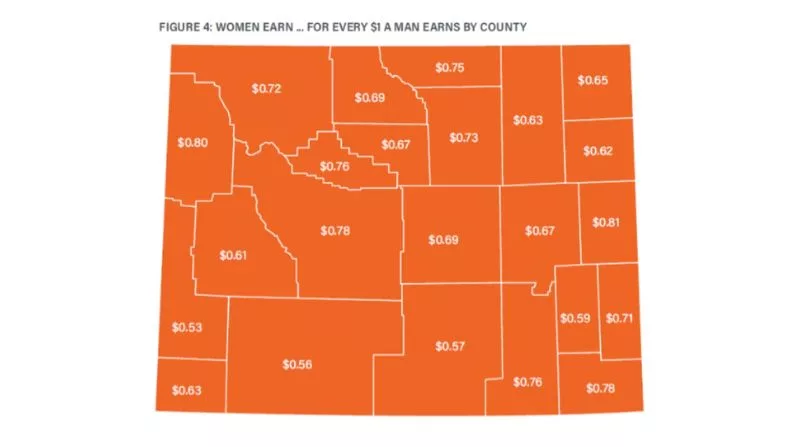Wyoming women make 75 cents for every dollar earned by men. That’s according to a new report from the Wyoming Women’s Foundation, which found that women make less per hour than men do — even controlling for differences in occupation.
By taking the hourly wage, rather than annual income, the report could control for the fact that men tend to work more hours than women.
The foundation finds Wyoming women make about $17/hour on average. Wyoming men make almost $23/hour.
Teton County has the smallest wage gap in the state, but women still earn 80 cents for every $1 a man makes, according to this report. Neighboring Lincoln County had the largest wage gap, with women making 53 cents to every dollar.
Report co-author Anne Alexander said chosen occupation, industry and years of experience influence income.
“But what we find is that those factors only explain about four percent of the difference between men and women’s wages in Wyoming,” she said.
Alexander said the rest of the wage gap comes from the subtle, systemic ways that women are discriminated against — even when employers are not openly, intentionally discriminating. One example would be basing a new job’s salary on the salary a worker had in their last job. That practice compounds the existing wage gap over time, and entrenches the divide between men and women’s earnings.
“There are systems and history and cultural issues that are leading to the persistence of the wage gap,” Alexander said.
According to the report, Wyoming’s wage gap is one of the largest, if not the largest, in the country. That has knock-on effects for Wyoming families where women are primary or co-breadwinners. In most family units, women spend more time caring for children and doing domestic chores than their male partners, working a “second shift” that is almost always uncompensated.
The wage gap also means women are less able to build wealth or save for retirement. It also means women have to rely more frequently on public programs funded by taxpayers.
The Wyoming Women’s Foundation report also makes recommendations about how to reduce the wage gap. While explicit gender-based wage discrimination is illegal, Alexander said employers can reduce systemic discrimination in a number of ways.
“They can advertise their salary or wage ranges — and that’s good for everybody, that’s not just good for women, that’s good for all workers,” she said. “(And) not basing next salary on previous salary. You should base salary and wage offers on the job itself and the person’s qualifications no matter what their gender is.”
Alexander said companies should also conduct regular audits.
“Are there places where, inadvertently over time, we have let this happen to our workforce? We want to make sure everybody is fairly treated and rewarded for the good work that they’re doing on an equal basis if they’re doing equal work with the same amount of experience, education and credentials.”






